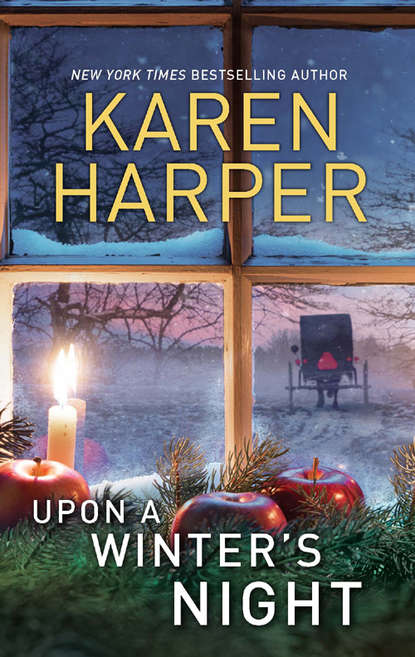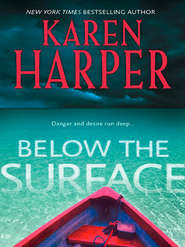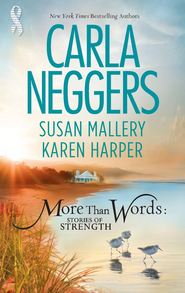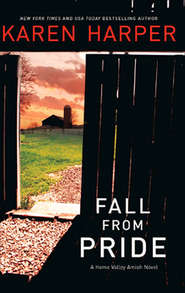По всем вопросам обращайтесь на: info@litportal.ru
(©) 2003-2024.
✖
Upon A Winter's Night
Автор
Год написания книги
2018
Настройки чтения
Размер шрифта
Высота строк
Поля
Her voice caught. David and Lena, David and Lena... Their names were David and Lena... And her mother’s people were Hostetlers. She knew of some in this area, though not in the Homestead Amish church.
She cleared her throat, blinked back tears and continued.
“...were pronounced dead at the scene after a vehicle carrying four tourists from Parma, Ohio, struck their buggy at approximately 9:00 p.m. on Wednesday.
Clinton MacKenney, the Holmes County sheriff at the scene, theorized that skid marks indicate the vehicle, a station wagon, careened over the hill behind the buggy at a speed of at least fifty miles per hour, could not stop in time and hit the buggy from the rear. Marvin Lowe, 65, was cited for driving over the speed limit with reckless abandon. Further charges of double manslaughter may be forthcoming.
Lowe made no statement but said he will soon have a lawyer. His vehicle sustained minor damage...
“Minor damage,” Lydia whispered, blinking back tears. “It isn’t fair. So perhaps there was a trial.”
“But this gives us all we need to know to start searching.”
“And there’s no way my mother could still be alive,” Lydia admitted with a sigh. She’d told Sandra about the note. “Talk about getting my hopes up...”
Sandra shook her head. “So sad. A tragedy that could have been avoided. Do you want me to read the rest of it?”
“Okay but I’m fine. Well, not really, but I want to find out no matter what.”
Sandra took up where she’d left off.
“Since it was nearly four hours after dark, the Brand buggy had two lanterns on the back, both surprisingly found still lighted in the ditch when medics and the sheriff arrived. The horse was also killed. The couple had wed barely a year ago and leave one infant daughter who is staying with relatives. David Brand was a tree cutter with a company in Amity.”
“A tree cutter,” Lydia repeated. “I wish it said if they left behind other family—siblings, cousins.”
“I can search for their obits later, and those might tell.”
“Maybe. The Amish come from far and wide for funerals. More likely their obituaries appeared in The Budget, the national Amish newspaper. But I’m sure no one keeps clippings from that in folders or databases.”
“I forget I’m dealing with an enclave culture here.”
Another word Lydia didn’t know but she got the idea.
“I just wonder,” Sandra said as she turned off the light on the car’s ceiling and backed out, “if the relatives you were staying with the night of the accident or thereafter are your adoptive parents or if there were others who took care of you at first. What’s the relationship between your adoptive father and your biological father?”
“I’m not sure. A cousin, not first cousin. Ach, our people value family, even extended family, and many know their roots way back to the few Amish families who migrated from Europe to escape persecution there. And here, I know next to nothing,” she added, blinking back tears again.
“But you know a lot more than a few minutes ago, and it gives me information to start digging. It’s obvious your real mother died in this accident,” she said, “but Victoria’s note gives us such an interesting twist we might still want to check it out.”
“Yes, I still do,” Lydia told her, stroking the old photo of the scene of the double murder—that’s what it was, murder! Nothing to do about that this late, of course, except try to forgive. But unlike what her daad and mamm wanted, after today, she could never forget. Like she’d heard Josh say once when he was talking about his time in the world, A little knowledge is a dangerous thing.
7
“Lydia, it’s so raw outside, and I’m afraid I’m getting a cold,” Mamm told her late Tuesday afternoon, the day after Lydia and Sandra had been to Wooster. She did, Lydia thought, sound nasal and had been blowing her nose, though sometimes she thought Mamm had private crying bouts and sounded like that, anyway.
“I know you’re heading for the animal barn,” Mamm said, “but could you take these four loaves of bread outside to Mattie Esh for the Stark funeral?”
Although Lydia had overheard that some local Amish women referred to her mother as “Sad Susan,” Mamm was also known in the community for her generous gifts of what most outsiders called Amish friendship bread. She gave loaves of it away for Christmas gifts and anytime the church had a special event. Even the local Englische knew to look for it in her plain brown wrappers at Amish benefits and yard sales.
But Mamm kept the starter yeast mix and recipe to herself. Lydia had once asked why, when the sharing of those things was part of the idea of friendship. Her mother had simply said that the bread alone was her gift to her people. But Lydia came to believe the cinnamon-crunchy sweet bread was Mamm’s way of trying to make up for a tart tongue and sour outlook on life. And Mamm’s sending anything to the Starks surprised Lydia, though Mamm often contributed bread to local funerals.
Pointing out the window, Mamm went on, “Mattie and Anna Kauffman are buggying up the lane right now, see? Since I’m on the church list to donate bread for local events, I could hardly say no when the Starks, living next door all these years, have a family funeral—which I wish you were not attending, you and Josh.”
“Mamm, we’re honored to represent the Amish community. Sure, I’ll take the bread out to them, then just head over to Josh’s. I’m going to walk through the woods because Flower got chilled waiting for me in the store barn all day.”
“Flower! You and your animals. Here, the bread’s in this sack.”
“And smells wonderful, as usual!” Lydia lifted the sack and gave her a quick kiss on the cheek. She had tried very hard since yesterday to be affectionate toward both her parents. After all, they’d taken her in after the tragic death of her birth parents. They had treated her as their own when she’d lost David and Lena Brand...David and Lena... She loved to recite their names to herself. Lydia wondered what else Sandra might have found, cross-checking other sources, as she’d put it.
In the mudroom, she quickly donned her bonnet and warmest cape—the one she’d placed over poor Victoria Keller—stuffed her feet into boots and tied a woolen scarf around her neck. She yanked her gloves on, picked up the sack of fragrant bread and hurried outside. Lacy snowflakes sifted down, but they didn’t seem to be piling up fast. The two women, Mattie Esh, the bishop’s wife, and one of her good friends, were in a large family buggy.
“Hello, Mrs. Esh and Mrs. Kauffman,” Lydia greeted them. As she lifted the sack to Mrs. Kauffman, she saw the backseats were full of baskets and bags. “Oh, my, what a lot of food!” she blurted.
Mrs. Esh told her, “The church really wanted a special outreach to the Starks to show our love and concern for them.”
“And not because Connor is mayor now,” Anna Kauffman added with a sharp sniff. “Nor because Bess Stark has worldly political power. But we want to extend the right hand of fellowship to those who seem trapped in the world’s ways. Speaking of hands, we could use an extra couple of strong ones to unload, sure we could. Lydia, can you ride along with us next door to help drop these things off? It won’t take long, and we’ll bring you back home.”
Though she was eager to head over to Josh’s, she told them, “Ya, of course, I’d be glad to help.” She climbed up in the buggy and held the sack of still-warm bread in her lap so she could fit on the second seat.
Mrs. Esh turned the buggy around, and they headed back down the lane. “How are Hannah’s twins, Mrs. Esh?” Lydia asked. Her daughter Hannah had gone to the world for a while to pursue a singing career, but had returned home, wed Amish and sang now only at their weddings.
“Big for their ages, and lungs strong like Hannah’s. They will be two strapping boys, Lord willing. You know, she sings to them all the time. Hannah’s little adopted four-year-old girl, Marlena, is a big help.”
Oh, ya, that’s right, Lydia thought. Hannah had more or less adopted Marlena when she married the widowed Seth Lantz, but Seth was the girl’s real father, so she’d never actually been orphaned. And Lydia just bet Hannah and Seth told their little girl all about her real mother and didn’t try to ignore or hide the truth.
“And how is your daughter Sarah doing?” Lydia asked Mrs. Kauffman. A noted Ohio artist, Sarah had been shunned for painting the faces of people she knew and for wedding an outsider. But Lydia knew the Kauffmans still saw her and her husband and their little daughter from time to time. What would happen when Mamm and Daad finally learned that their own daughter had defied them?
“Sarah’s doing good but should still stop painting faces for her work,” Mrs. Kauffman said, and Lydia realized that was that.
Soon they were buggying past the rows of Christmas trees the Starks sold this time of year. The big banner was up over the lane that led a short way to the barn where they bundled their yearly crop of firs and pines, the short-needled ones barely dusted with snow, others bowing their branches under its weight. Those who lived near the tree farm knew it was almost a year-round task to care for the trees. The seedlings were planted mid-April, and shearing and shaping went on through the hot months of June and mid-July. In the late autumn, skilled workers with rotary pruners trimmed the trees which went on sale late November and December. The familiar banner read, Stark Choose-and-Cut Christmas Tree Farm. Open Now to Christmas. Hay Rides, Cider, Cocoa Free.
More rows of trees, some tall, some growing for future years, sped past Lydia’s gaze. The Starks had twenty-five acres of trees, just the right size farm, she’d heard, for a family to run with only seasonal help. She had not been at the Stark house for years, not since Mamm had laid down the law about her visits there. The fragrant, crisp scents of blue spruce, Fraser fir, Scotch and white pine vied with the smell of the bread in her lap. The rows of trees wrapped around the slant of the hill on which the Stark mansion perched. When it was lighted at night, Lydia used to think the house was like its own star atop a giant tree.
The horse team pulled the big buggy easily up the lane, since it wasn’t slippery. Years ago, the Starks had put some sort of heating pipes under the pavement, so the snow and ice melted off. It sure saved a lot of shoveling. Who knew what wonders were to be found in their house itself after all these years.
At the side door, they unloaded their goods, met not by a family member but by a woman in a canvas apron. “Hi, I’m Jenny from the caterer’s,” she told them. “What wonderful gifts. Perhaps we can have an entire Amish table at the funeral, and the family will be so grateful. Senator Stark’s in town with her daughter-in-law, but Mr. Stark is out in the trees somewhere. They will all be delighted. How kind of you.”
The three of them and Jenny carried the baskets and boxes of food inside to a pantry area with Jenny’s continued thanks. From the vantage point of the side porch, Lydia could see that Connor was not down by the barn, with the other seasonal workers, but in a row of about five-foot trees on a slant of the hill overlooking her house. She would, of course, have a chance at the funeral tomorrow to tell him she was sorry for his loss, but he’d be busy with other people. He’d been so upset that night they found his aunt in the snow.
“If you don’t mind,” she told Mrs. Esh, “I’ll just walk back to my house. Cutting down the hill will be much shorter.”
“Of course, my dear, and we thank you for the help, we surely do. We will be in prayer tomorrow that you and Josh Yoder will represent our people well at the funeral.”
“Danki,” she told them. “I appreciate all the prayer support I can get.”
* * *
“Lydia’s late,” Sandra told Josh when he came back to the house to see how she was doing. She was sitting at his dining room table still typing away on her laptop about, he guessed, Old Amish Christmas. “She’s not in the barn, is she? I’d rather go over a battle plan with her in here.”











